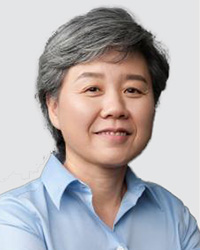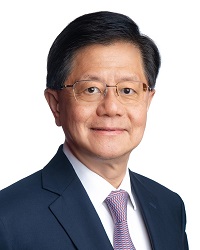Webinar Series
2021
Session Chair: Professor Bernard YEUNG
Stephen Riady Distinguished Professor in Finance and Strategic Management, National University of Singapore and President, ABFER
Professor Jun PAN, Professor of Finance, Shanghai Advanced Institute of Finance (SAIF), Shanghai Jiao Tong University and Senior Fellow, ABFER
Co-author:
Mr Zhe GENG, Shanghai Advanced Institute of Finance (SAIF), Shanghai Jiao Tong University
Discussant:
Professor Zhiguo HE, Fuji Bank and Heller Professor of Finance and Jeuck Faculty Fellow, Booth School of Business, University of Chicago and Senior Fellow, ABFER
Speakers
-

Professor Jun PAN
Professor of Finance, Shanghai Advanced Institute of Finance (SAIF), Shanghai Jiao Tong University and Senior Fellow, ABFER
Jun Pan is currently a Professor of Finance and SAIF Chair Professor at Shanghai Advanced Institute of Finance (SAIF), Shanghai Jiao Tong University. Prior to joining SAIF in 2019, she was the School of Management Distinguished Professor of Finance and Professor of Finance at MIT Sloan School of Management. Jun has a B.S. degree in Physics from Shanghai Jiao Tong University, a Ph.D. in Physics from New York University, and a Ph.D. in Finance from Stanford University.

Professor Zhiguo HE
Fuji Bank and Heller Professor of Finance and Jeuck Faculty Fellow, Booth School of Business, University of Chicago and Senior Fellow, ABFER
Zhiguo He is interested in the implications of agency frictions and debt maturities in financial markets and macroeconomics with a special focus on contract theory and banking. His recent research focuses on the role of financial institutions in the 2007/08 global financial crisis. He teaches an elective MBA course, “Chinese Economy and Financial Markets,” and is conducting academic research on Chinese financial markets including the stock market, local government debt, shadow banking, and interbank markets together with recent regulation changes. Professor He has also been writing academic articles on new progress in the area of cryptocurrency and blockchains.
His research has been published in leading academic journals including the American Economic Review, Econometrica, the Review of Economic Studies, the Journal of Finance, the Review of Financial Studies, the Journal of Financial Economics, and Management Science. He has been an associate editor for the Review of Financial Studies and Management Science and currently serves as an associate editor for the Journal of Finance. He serves as the guest editor of the Review of Finance for the “Special Issue on China” in 2020-2021.
Professor He received his bachelor and master degrees from the School of Economics and Management at Tsinghua University before receiving his PhD from the Kellogg School of Management at Northwestern University in 2008. He has been named a 2014 Alfred P. Sloan Research Fellow, and has won numerous awards for his outstanding scholastic record, including the Lehman Brothers Fellowship for Research Excellence in Finance in 2007, the Swiss Finance Institute Outstanding Paper Award in 2012, the Smith-Breeden First Prize in 2012, and the Brattle Group First Prize in 2014. Before joining the Chicago Booth faculty in 2008, he worked as a stock analyst at the China International Capital Corporation in Beijing in 2001 and visited the Bendheim Center for Finance at Princeton University as a post-doctoral fellow.
In Autumn 2015 Professor He was the Dean’s distinguished visiting scholar at Stanford University, Graduate School of Business, and in winter 2020 he is a visiting professor of finance at Yale University, School of Management. In January 2020, he testified at U.S.-China Economic and Security Review Commission (USCC) Hearing on “China’s Quest for Capital: Motivations, Methods, and Implications.”
Professor Bernard Yeung
Stephen Riady Distinguished Professor in Finance and Strategic Management, National University of Singapore and President of ABFER
Bernard Yeung is Stephen Riady Distinguished Professor in Finance and Strategic Management at the National University of Singapore Business School. He is also the President of the Asian Bureau of Finance and Economic Research. He was Dean of NUS Business School from June 2008 to May 2019. Before joining NUS, he was the Abraham Krasnoff Professor in Global Business, Economics, and Management at New York University (NYU) Stern School of Business. He has also served as the Director of the NYU China House, the honorary co-chair of the Strategy Department of the Peking University Guanghua School of Management. From 1988 to 1999, he taught at the University of Michigan and at the University of Alberta from 1983 to 1988.
Professor Yeung has published widely in academic journals covering topics in Finance, Economics, and Strategy; his writing also appears in top-tier media publications such as The Financial Times, Economist, and The Wall Street Journal.
He won the Public Administration Silver Medal (2018) in Singapore, Irwin Outstanding Educator Award (2013) from the Academy of Management and is an elected Fellow of the Academy of International Business.
Professor Yeung was a member of the Economic Strategies Committee in Singapore (2009), a member of the Social Science Research Council (SSRC) in Singapore (2016-2018) and a member of the Financial Research Council of the Monetary Authority of Singapore (2010 -2013).
Professor Yeung sits on the 3rd Advisory Board of the Antai College of Economics and Management at Shanghai Jiao Tong University, the Advisory Council of the Economics and Management School of Wuhan University and the Advisory Committee of the Institute of Economics, Academia Sinica. Professor Yeung also serves as an independent Non-Executive Director of the Bank of China (BOC) Aviation Limited since 2016.
Professor Yeung received his Bachelor of Arts in Economics and Mathematics from the University of Western Ontario and his MBA and PhD degrees from the Graduate School of Business at the University of Chicago.- 1
Hosting Organizers
ABFER and University of Chicago's Becker Friedman Institute China (BFI-China)
Collaborating Organizers
National University of Singapore (NUS) Business School, Shanghai Advanced Institute of Finance (SAIF), The Chinese University of Hong Kong (CUHK) Department of Economics, CUHK-Shenzhen and Tsinghua University PBC School of Finance (Tsinghua PBCSF)

